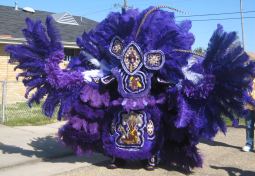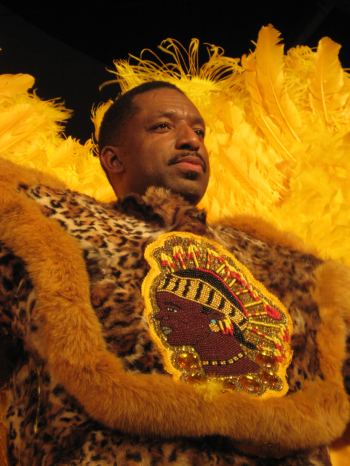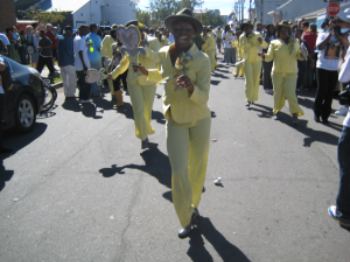Recently in neworleans Category
Click on Winter Issue to Preview
Just a bit of reflection on hurtling balls of precipitation and anniversaries.
A email on Thursday from Long Island's Stephen Talkhouse informed me that, with Irene (then still a bona fide hurricane) on its way, last weekend's shows by Trombone Shorty and his Orleans Avenue band would be cancelled.
"Having lived through Katrina," the promoter explained,
"they have opted to head home."
A New Orleans musician heading back home from New York to avoid a hurricane--to feel safe. Irony is only a few letters removed from Irene. It turned out that, for New Yorkers, Irene wasn't the monster it appeared to be--and could well have been. Not to dismiss the floods, blackouts, damages, costs, and even, up and down the East Coast, several losses of lives. But we were braced for something far more devastating and it looked real.
In my Brooklyn neighborhood, save for a few fallen trees, Irene was mostly just heavy rains and howling winds while holed up inside. But don't head to a hardware store the day before a forecast hurricane. There is the smell of panic. Flashlights? Gone. D Batteries? Sold out. Duct tape? Shoulda come yesterday.
Only days earlier, I'd been rethinking my plans, considering heading down to NOLA for what I hesitate to call an "anniversary" of the landfall of Hurricane Katrina, the precipitating event of the levee failures that caused the flood of 2005, leading to a manmade disaster of unprecedented and long-running proportion. It felt odd not to be covering the day for a newspaper or magazine, as I have each of the past six years, save for the one, three years ago, when my boy Sam was newborn. For me, the 29th is more than an anniversary or commemoration; rather, it has been a peg to draw national (and editors') attention to both the ongoing needs and glories of a city I've come to hold as dear as the family with which I was holed up.
Brass-band street musicians are once again at odds with the NOPD and the powers that be. Unlike the scene I wrote about in Tremé in 2007, nobody's been hauled off in cuffs (yet). Newly elected mayor Mitch Landrieu and his newly appointed police chief Ronal Serpas are too wise for that. But some old and probably archaic noise ordinances are being dusted off an enforced to the detriment of the very spontaneous street action depicted in, say, HBO's "Treme".
You can find a
good account of this still-developing story at the N.O. weekly Gambit's blog here.
And a further update here.
As always, the Times-Picayune's Katy Reckdahl puts it in good perspective:
Along with the storied legacy of street music in New Orleans is a long history of those very streets (and plazas, such as Jackson Square) as contested space. I touched on all that in my Village Voice piece on HBO's "Treme" (if you're willing to read most of the way through, that is...)
If you want to register indignation in a productive way, try this FaceBook page:
Anyway, I'm trying to stay on top of the current situation, and I'll write more on this when I know more.

As seven New Orleans police cars converged on the corner of Second and Dryades streets on Mardi Gras night, Big Chief James Harris of the Seminole Warriors grabbed for the five youngest members of his Mardi Gras Indian tribe, all of them younger than 6.
Holding up his feathered purple, green and yellow wing, Harris tried to slow the cars, but they kept moving through the thick crowd of parading Indians and spectators, sirens blaring and tires squealing.
Harris said he barely was able to pull the children to the sidewalk. "They were scared," he said. "One ran this way and the other ran that way."
Rebirth Brass Band snare drummer Derrick Tabb is nominated for a CNN 2009 "Heroes" award. He deserves it. Vote him in here.
You'll feel heroic too.
Here's my testimony on his behalf:
I remember in 2007, when Tabb and his brother, Glen David Andrews, were arrested during a memorial procession in Tremé for a fellow musician who had passed away. Outside the courthouse where the two had to appear, their attorney Carol Kolinchak read out loud the charges against the two, which were illegible on the carbon copies of citations they'd been handed: "parading without a permit," and "disturbing the peace by tumultuous manner." She'd entered not-guilty pleas on all counts. Tabb pulled out a pen and noted the spelling of tumultuous; he wanted to check the definition carefully, to understand how he could qualify for such a description.
The city dropped the charges a few months later with no further comment; that development received far less attention than the initial arrests.
I'll never forget Tabb outside that courthouse. He was angry about the arrest. But instead of lashing out, he struck out against the poor conditions in local schools and lack of both proper instruction and decent instruments when it came to music education. In 2007, he was dreaming big, about a program he wanted to call "The Roots of Music."
He wanted to create an after-school program to augment the school district's gutted music programs, and to help develop students into brass-band musicians. "Right now you don't have the musicians in the neighborhood anymore because that environment is totally gone," he said. "This city had five great band directors in high schools when I came up." And it was about more than just music. "Right now, it's easier for a kid to get a gun than a trombone. We're trying to change that reality."
Two years later, Tabb's idea is a reality...
I missed the spectacle of Tom DeLay, former Texas Republican Congressman, now rhinestone cowboy, shaking his ass, sliding on his knees, and playing air guitar to "Wild Thing," on Dancing with the Stars, as investigators mulled money-laundering charges against him.
But I was struck by the how well DeLay--who, while
representing a state that is more than one-third Hispanic, supported a 1999
bill to declare English the official language of the U.S.--highlighted the Afro
Latin roots of American music. He danced to the Troggs' 1966 hit in a cha-cha
competition.
How enlightened, Tom.
So pronounced is the clave of that song, that one would need
to strain not to hear it. Yet the centrality of Afro Latin roots to early rock
and roll is a well-kept secret in this country. The best exposition of this
truth can be found in Ned Sublette's terrific first book, "Cuba and Its Music:
From the First Drums to the Mambo" (he uses "Louie, Louie" as the essential
case). And I'll tip my hat to Ned, who tonight celebrates the release of his
fine new third book, his second on the Crescent City, "The Year Before the
Flood: A New Orleans Story." Wish I could be at the Mother-in-Law Lounge, to
hear the always animated Sublette read, across the room from an inanimate
likeness of Ernie K-Doe (who is among the book's characters), at what promises
to be the mother-in-law of book parties.
I'm rereading Ned's book now, as I work on an essay about it
for The Nation.
This year, the Young Men Olympian, Jr. Mutual Aid and Benevolent Society celebrates 125 years of community engagement and service, as well as cultural celebration. On Sunday, September 27, the club will hold their second parade of the season, starting at their home base on Josephine Street. And this Thursday evening, September 24, the Young Men Olympian will precede their annual parade by joining SilenceIsViolence and the Social Aid and Pleasure Club Task Force in a City Walk/Peace Walk through the Central City neighborhood.
For over a century, the Young Men Olympian have quietly done community service and public safety work, without seeking recognition or reward. The club membership participates in cemetery clean-ups, Night Out Against Crime sponsorships, peace rallies (including a memorial for police officer Nicola Cotton), and much more. We are honored that the group has chosen to partner with SilenceIsViolence and the Social Aid and Pleasure Club Task Force for Thursday's Peace Walk. Please join us at the Young Men Olympian, Jr. Hall, 2101 Josephine Street, at 6pm this Thursday. We will follow a circular route, spreading a message of peace, ending back at the Hall around 7pm. A brass band will perform after the walk.

Oh, how I wish I'd been in Morocco last week. Saxophonist Donald
Harrison, who is also Big Chief of the Congo Nation, a tribe in the Mardi Gras
Indian tradition, made the trip to Essaouira, Morocco, for the 12th annual Gnaoua &
World Music Festival.
This must have been some melding of spiritual power and rhythmic drive. Here's how Willard Jenkins, who organized the trip along with Snug Harbor's Jason Patterson, described it (you can also find some excellent background on the Gnawa archived at Willard's Independent Ear blog):
For two performances - one midnight event at the Chez Kebir club space with Gnaoua musicians from Agadir, Morocco, the other a grand collaboration on the big stage at Moulay Hassan Square with a Gnaoua ensemble from Essaouira before approximately 100,000 celebrants - Donald Harrison's Congo Nation ensemble, with percussionist Shaka Zulu masking in stunning green, performed an uproarous concert with the Gnaoua ensemble of Maalem (master) Mohamed Kouyou. Donald characterized their connection as "profound" and his having been "transformed" by the experience of bringing his Black Indian traditions to this unique partnership.
I've tried wherever I can to lend a sense of context to presentations of New Orleans music, in terms of history and especially the current situation. So I was thrilled when The Wall Street Journal asked me to host a July 15th panel discussion at Lincoln Center's Kaplan Penthouse about just that topic, as part of "Summer Scoops: Live with the Wall Street Journal," the paper's new series of intimate discussions with culture-bearers.
Please pass the word on about the following and, for or those of you in New York, please let me know if you'd like to attend the panel (There'll be a limited number of press and guest seats available.)

TALKING:
Do You Know What It Means to Miss New Orleans?
Wednesday, July 15, 7:30 p.m.
Stanley H. Kaplan Penthouse, Lincoln Center
Trumpeter and film composer Terence Blanchard, singer Tammy Lynn, and Ira "Dr. Ike" Padnos, the founder of the Ponderosa Stomp, a festival dedicated to promoting American roots music, gather to tell the city's untold stories and to reveal the fight to preserve art and culture in the wake of Hurricane Katrina, in discussion with Larry Blumenfeld, who writes about jazz for the Wall Street Journal. A live performance by the Terence Blanchard Quintet concludes the evening.
Ticket price: $30
$22.50 student tickets available! Students may buy up to four tickets in advance at the Avery Fisher Hall Box Office or online at lincolncenter.org. For online purchase use promo code STUWSJ25. Students must present a valid student ID when purchasing or picking up tickets at the box office.
This panel is an outgrowth of my writing about New Orleans during the past four years for The Journal and other publications. Trumpeter Terence Blanchard is one of this generation's most powerful jazz voices, via his trumpet, his band, and his wide-ranging film scores; his 2007 CD A Tale of God's Will is among the most articulate and pointed musical responses to Katrina. Tammy Lynn possesses a singular voice, fierce one moment, tender the next; more so than perhaps any other New Orleans-bred singer, she blends R&B with bebop, owing to her work decades ago with the landmark AFO collective. And Ira "Dr. Ike" Padnos supports New Orleans culture in many less-than-obvious ways; through his "Ponderosa Stomp" he's quite visibly revived careers, thrilled aficionados, and created one of the great American-music celebrations.
STOMPING: For years, my friends had urged me to check out Ponderosa Stomp, a jewel of a festival each year for the past eight in New Orleans, tucked in between the weekends of the annual Jazz & Heritage Festival (These days, it's the action during that in-between week that forms my own personal festival.) In 2008, my Ponderosa Stomp moment came via a tribute to composer-arranger-bandleader Wardell Quezergue, who has been called the "Creole Beethoven" and must certainly be in anyone's New Orleans pantheon of Midas-touch hitmakers (think "Iko, Iko," "Mr. Big Stuff," "Chapel of Love"...)
Blogroll
CultureGulf
be.jazz
rifftides
Alex Ross: The Rest is Noise
Dave Douglas: Greenleaf Music
birdlives
Lerterland
point of departure
Jazziz magazine
Jazz Journalists Association
Steve Smith: nightafternight
Willard Jenkins: Open Sky Jazz
music/food/justice in NOLA
Howard Mandel's JazzBeyondJazz
Stereophile:Fred Kaplan
